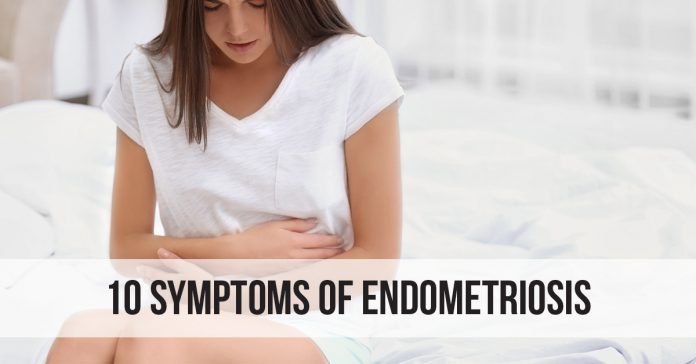Endometriosis: The Facts
Endometriosis is the condition where the lining of your uterus grows around your uterus instead of inside it. Not only does this affect your uterus, but it also can affect your fallopian tubes, ovaries, and possibly
even your cervix. It can take over your ability to live your life to the fullest. You may not be able to have children, have sex comfortably, or possibly wear a tampon. It is not a condition that you cannot diagnose on your own. You will need to see a doctor for a diagnosis and a treatment plan.
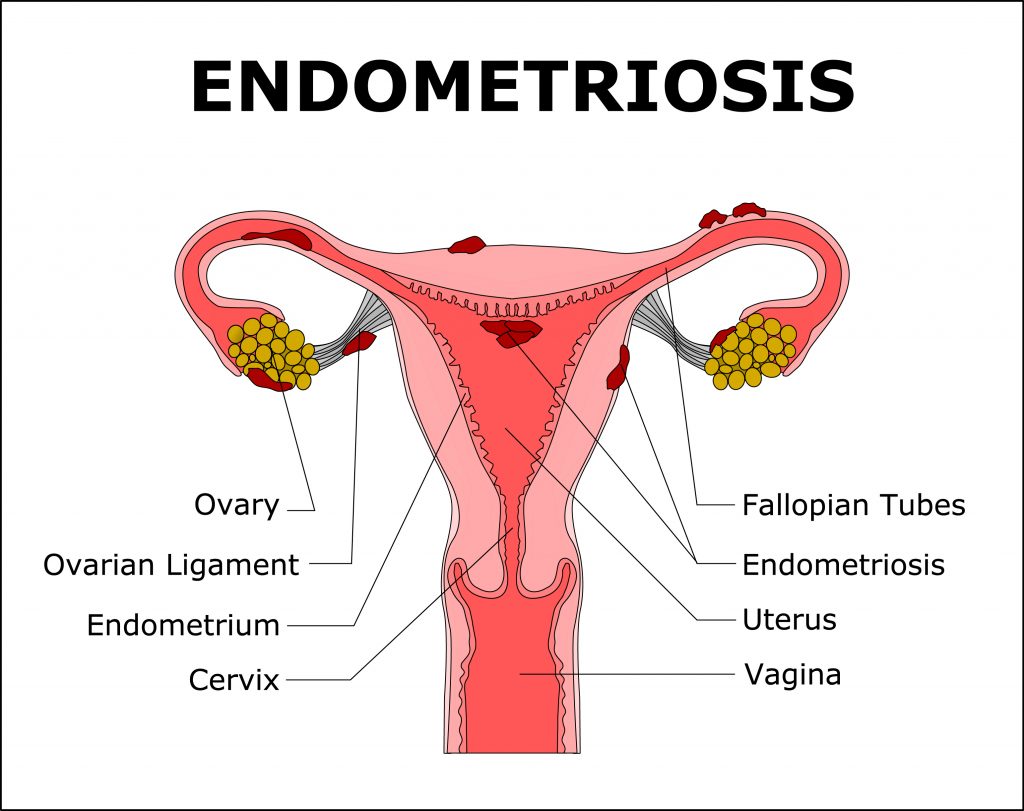
There are times in a woman’s life when it feels like our body is betraying us. We have symptoms that make us go through a list of ailments from pregnancy to menopause. What’s a girl to do when her body is confusing her? First, she should probably take a list of her symptoms to her doctor. Second, she should look at these symptoms of endometriosis to see if her symptoms are caused by this. As you read, you will find the ten most common symptoms of endometriosis.
How is Endometriosis Diagnosed?
Your first step to getting a diagnosis is going to be something you should have done yearly. A Pap smear and pelvic exam are going to give a glimpse of whether you could have it. The doctor is going to feel for scars, legions, or other abnormalities that will tell them you need further testing. Sonograms will give the doctor an inside view of your female organs to see if you have a thickened lining or extra tissue. You will probably get a blood test to rule out any other diseases or complications. The last step is often a laparoscopy. This is where the doctor will take a small camera inside your uterus to get the best possible view. The doctor will retrieve a sample to do lab testing to confirm.
Endometriosis Treatment
You will want to discuss each one with your doctor prior to deciding what is best for you. This is because some treatment plans can be quite invasive, painful, and expensive.
Pain killers are one such plan. The biggest problem that you may have is that you have difficulties focusing on your everyday routines. You may not be able to drive, focus, or perform your regular duties. Another downside is that pain killers can be addictive.

Surgery is often a treatment because it will help to remove some legions and extra tissue from your uterus and surrounding area. The downside is that you may have an extended recovery time. Surgery does not always bring the relief that you may need, which may not be evident until after you have the surgery.
Finally, birth control as a treatment plan may be the answer you have been looking for. Not only can it sometimes prevent symptoms from occurring, but it can also help with the hormone imbalance that comes with having reproductive conditions.
Ten Symptoms of Endometriosis
Now that you have seen how endometriosis is diagnosed and treatment plans, let’s look at some of the symptoms that you may be facing. Along with the symptoms, we will list possible relief options for the symptom.
- Issues with your cycle.
Endometriosis can cause your periods to be irregular. You may skip your periods, go months without a period, or your periods may be unpredictable. You may have super heavy periods. Your periods maybe be so painful that you cannot do anything at all. You may experience pain that radiates into your stomach. Your cycle may cause you to be physically sick, extremely depressed, or irrational. Your period may be completely normal, but your ovulation could be painful. If your period seems abnormal, it is time to talk to your doctor.
You can try a hot or cold pack. Pain relievers may give you some relief. Talk to your doctor about birth control to help alleviate your pain and discomfort.
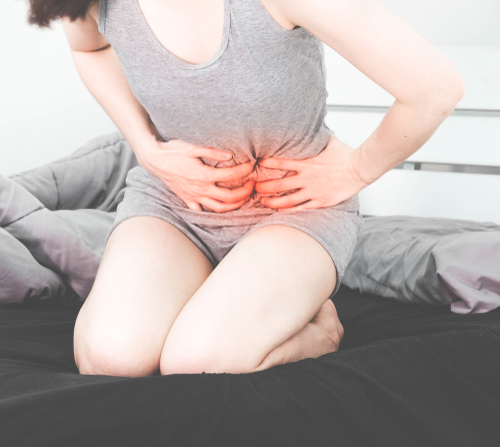
- Sexual Discomfort
Pain during sex is not normal. It is not something that you should regularly experience. Painful intercourse can have many causes. You should have a blood test done to rule out any other conditions, but it could be caused by the legions or extra tissue that endometriosis causes. Your doctor will be able to help you.
You could try taking an over the counter pain relief pill before you have sex. This may reduce the pain you feel during sex. Using lubricants can also help ease the pain that is caused by dryness.
- Bleeding
Bleeding during your cycle is expected, however, if you have a cycle that lasts more than seven days it is time to talk to a doctor. Endometriosis can also cause bleeding during ovulation, after sex, or randomly throughout the month. This can be barely noticeable bleeding to menstruation-like bleeding. It can also last anywhere from an hour to several days. You will not always experience pain with this bleeding, but it is a possibility.
Unfortunately, there is not a lot you can do to prevent the bleeding. You should definitely track it. If you can keep a journal of the bleeding, you may be able to notice patterns to the bleeding. This can help your doctor to treat your symptoms better.
- Gastrointestinal Discomfort
You may be surprised to learn that your sensitive stomach may be caused by your endometriosis. Loose bowels, nausea after eating, the inability to hold down food, or the inability to eat certain foods may be due to the pain that is deflected into your abdomens or even the hormone imbalances that endometriosis can cause.
Keep track of what you eat and when you eat to see if there is a pattern to your discomfort. Try taking an antacid or any of the anti-gas pills that you can find at your local pharmacy. You can also try adding live active cultures to help digest foods and ease discomforts.
- Chronic Constipation or Painful Bowel Movements
If you can’t go to the bathroom or it hurts to the bathroom, it may be because of the tissues growing outside of your uterus pressing on your bowels. You may notice that you have blood in your stools or that you are suffering from hemorrhoids.
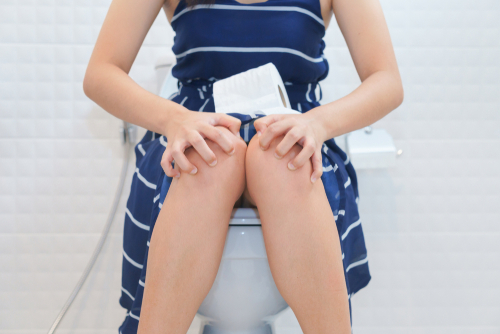
The best thing you can do is stay hydrated. You need to drink at least one-third of your body weight in ounces of water every day. Eat high fiber foods. You can take a stool softener at night before you go to bed to help get things moving along as well.
- Chronic Fatigue
Do you feel tired all the time? There is a reason for that. Your body is working overtime. Your digestive system and reproductive systems are both out of order. You may even suffer from insomnia. Getting your body systems back in order will go a long way in relieving your fatigue.
All the B vitamins can help you to feel more like yourself. You need to devote at least eight hours to sleep every night. Try not to sleep with your devices in your room. The pulse that they release may affect your ability to get into a deep sleep.
- Inability to Conceive
When you really want a family and can’t have one it can feel like the whole world is against you. Unfortunately, a lot of women with endometriosis have this problem. While there isn’t a lot you can do at home for it, you can track all your symptoms and have them ready for the doctor. Make sure you are very detailed. That way you know which one’s important symptoms and which ones are nothing to worry about.
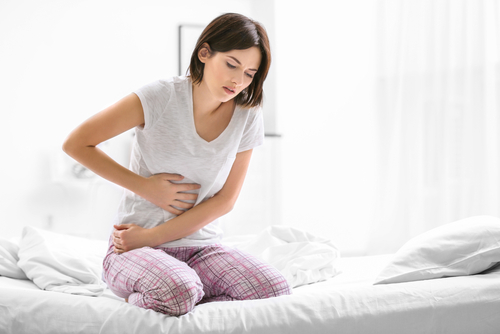
- Pain
Your pain, in general, can be a symptom of Endometriosis. The stress that it puts your body through can cause the pain to be reflected in strange places. Your joints may ache. You may get headaches. You may just not feel good.
The best way to deal with this kind of pain is to take an over the counter pain relief medication. Try soaking in a detox bath. If it is reoccurring, keep track of when you notice it and what you are doing.
- Lower Back Pain
Your reproductive system is known for causing back pain. Painful periods are felt in your back. The reason is that your uterus is slight to the back. The extra tissues or legions are all going to push into your back. That means that your back pain isn’t caused by your job.
Try wearing a brace belt along your lower back. Relax in a hot shower or on a heating pad after a long day. Essential oils are great for home massages and can help to relieve lower back pain.
- Depression
Depression is very common anytime you are dealing with a chronic condition. Pain, fatigue, the inability to enjoy life, and the restrictions that tend to come along with endometriosis can wear your down.
There is no reason to allow yourself to be trapped in this state. Reach out to friends and family. Go to counseling. Talk to your doctor. Find a hobby you enjoy. These are just a few ways to battle depression.
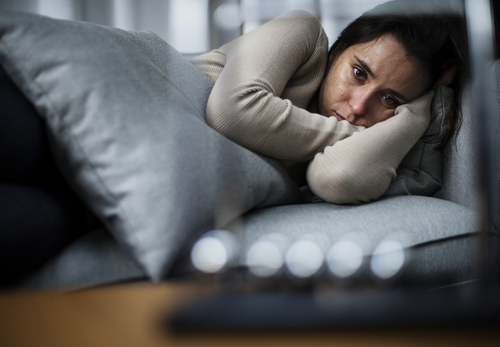
It is our hope that you found this informational. Whether you just found out you have endometriosis or just suspect it, you are now armed with the knowledge you need to feel like you are in control of your options. After all, knowledge is the first part of any treatment plan.


